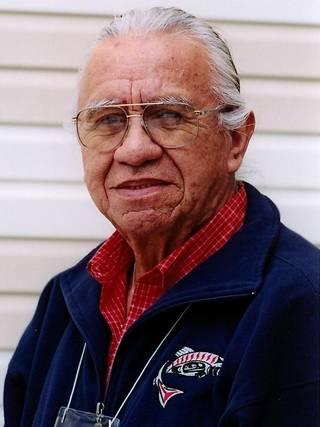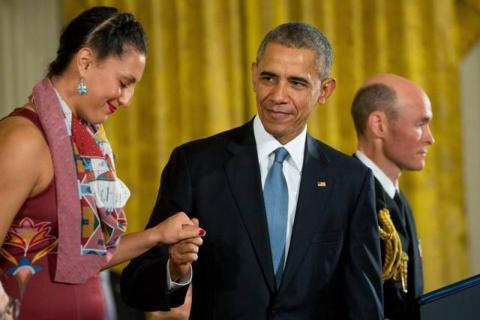 |
Canku Ota
|
 |
|
(Many Paths)
|
||
|
An Online Newsletter
Celebrating Native America
|
||
|
January 2016 - Volume
14 Number 1
|
||
|
|
||
|
Billy Frank, Jr.,
Indigenous Fighter For Sovereign Rights, To Receive Presidential
Medal Of Freedom
|
||
|
by Meteor Blades - Daily
Kos
|
||
Billy Frank, Jr., a Nisqually Indian who died last year, is one of two recipients being honored Tuesday with a Presidential Medal of Freedom because they were resisters. The other is Minoru Yasui (who you can read about here). Frank is best known for his successful fight over Indian fishing rights in Washington state in the 1960s and ‘70s. The right to hunt, fish and gather shellfish were supposedly made permanent in treaties with the tribes of western Washington in the 1850s. But more than a century later, every time Indians fished off their reservations, they would be arrested for violating state law. Ultimately, the fishing rights matter went to the courts, and in 1974, a federal district court decided in favor of the tribes in U.S. v. Washingon in the Boldt decision. In a powerful ruling Judge George Boldt stated that the Nisqually and other tribes would become co-managers with the state of its fisheries. And they would be allowed to take up to half the salmon in their traditional waters. That ruling was upheld by the U.S. Supreme Court in 1979 and it remains, 36 years later, the leading case on Native fishing rights. When Frank died last year, William Yardley at The New York Times wrote:
State officials who did that arresting argued that Indians could only fish on reservation land. This presented a special problem for the Nisqually because two-thirds of their reservation had been grabbed by the city of Tacoma in 1916 and given to the U.S. Army so it could build Fort Lewis. Since several miles of the Nisqually river was included in the land transfer, the tribe had no choice but to seek other fishing areas. This was especially galling because the treaties had been "negotiated" by "chiefs" chosen by Isaac Stevens, the appointed governor of Washington Territory. Given the nature of leadership among the tribes, this was deeply resented by many tribal members and they refused to participate in the talks. But by the summer of 1855, Stevens had managed to get signatures on six treaties that pried millions of acres of land from the tribes. Now decades later, what was agreed in those treaties would be the tribes' rights in perpetuity was being flatly denied by the state. Although the federal courts had granted a petition in 1937 to keep the state from violating treaty rights, there was no enforcement. That's what pushed Frank to his first arrest eight years later. For the next 30 years, he and scores of other Indians from various Washington tribes were repeatedly arrested. They were harassed by state authorities and Indian-hating Washington residents. They were threatened, lost property and faced frequent violence from white vigilantes. Legal fees ran into the tens of thousands of dollars. Along with the Sioux-Assinoboine Hank Adams—who would later be instrumental in bringing to a peaceful end the 1973 stand-off at Wounded Knee, S.D., between government authorities and the American Indian Movement — Frank was one of a handful of Indian leaders in Washington to adopt the "fish-in" as a key tactic for restoring treaty fishing rights. This literally meant fishing in defiance of state law. Hence, the arrests. This approach, beginning in 1964, attracted considerable media attention. A few celebrities, most notably Marlon Brando and Jane Fonda, offered their support for the actions. Although most of the fish-ins were nonviolent, over the next few years, the stakes were raised. In the autumn of 1970, Indians and some non-Indian allies had set up camps along the river, including one with 200 people. Since armed game wardens frequently raided the site, Indians posted their own armed guards around the campsite for protection, a move that brought the full force of state law against them while denying treaty law. Finally, 100 government agents wearing riot gear attacked the camp. Shots were fired, tear gas released and the authorities beat Indians with clubs. In response, a firebomb was thrown and burned a wooden bridge across the Nisqually. More than 50 Indians were arrested and the camp was soon flattened with heavy machinery. The televised scenes of brutality did not play well with the public nationwide. It was at that point that the White House decided to intervene with a lawsuit, which eventually led to the Boldt ruling. That decision did not bring an immediate end to clashes. Right-wingers in the John Birch Society and sport-fishing associations attacked Boldt's decision and smeared him, even claiming that he had taken a "squaw" for a mistress. Vigilantes, including the Ku Klux Klan, vandalized Indian fishing gear and tried to sink their fishing boats by ramming them. Ultimately, after the Supreme Court affirmed the district court's ruling years later, things settled down. At the Oneida tribe-owned news site Indian Country Today, Peter D'Errico wrote of Frank last week:
While Frank often made that joke about being the "getting-arrested guy," he was far more than that. He was especially focused on restoring the dwindling salmon runs and doing his utmost to maintain the cultural identity of the Nisqually people. In addition to the Presidential Medal of Freedom, Frank may also be honored by having the Nisqually National Wildlife Refuge named after him. Democratic Rep. Dennis Heck, a friend of Frank, has signed up the entire Washington congressional delegation to support the name change. The legislation authorizing that passed the House Natural Resources Committee without dissent and now awaits action on the House floor.
Nisqually wildlife refuge to be renamed for activist Billy Frank Jr. |
||||
|
|
|
|
||
|
|
||
| Canku Ota is a free Newsletter celebrating Native America, its traditions and accomplishments . We do not provide subscriber or visitor names to anyone. Some articles presented in Canku Ota may contain copyright material. We have received appropriate permissions for republishing any articles. Material appearing here is distributed without profit or monetary gain to those who have expressed an interest. This is in accordance with Title 17 U.S.C. Section 107. | ||
|
Canku Ota is a copyright ©
2000 - 2015 of Vicki Williams Barry and Paul Barry.
|
||
 |
 |
|
|
The "Canku
Ota - A Newsletter Celebrating Native America" web site and
its design is the
|
||
|
Copyright ©
1999 - 2015 of Paul C. Barry.
|
||
|
All Rights Reserved.
|
||

